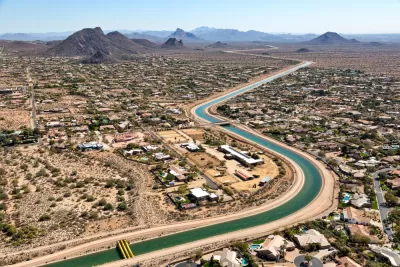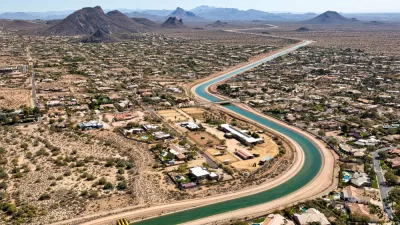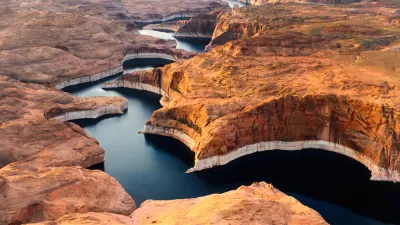The billion-dollar investment in the state's water supplies sounds good on paper, but lawmakers must also distribute funding effectively to mitigate the state's urgent water shortage.

An op-ed by Joanna Allhands argues that Arizona governor Doug Ducey's recent proposal to commit $1 billion to water projects won't be enough to solve the state's water woes. The governor's vague pledge, Allhands writes, leaves many unanswered questions about how the funds will be distributed.
Allhands also suggests that the governor's proposal doesn't bring enough attention to conservation, rather choosing to focus on projects that seek to augment water supplies. "If we only focus on finding new water, it leaves little incentive to use the water we have more wisely – something we could do quicker and, in most cases, at far lower cost."
According to Allhands, many of the more glamorous projects like desalination plants depend on other parties and are years away from completion. Meanwhile, the state could "raid" the general fund and deplete the water funding before it's allocated to specific projects.
Allhands cautions that lawmakers shouldn't forget about the policy side of things, even though those might be more difficult conversations. State leaders must tackle "not only how we sustain the uses that are already here, but also how we grow and where and (importantly) who pays for all of this."
Southwestern states are facing increasingly dire drought conditions. Last summer, when Lake Mead reached historic lows not seen since the reservoir's construction, the federal government declared a water shortage and implemented cutbacks for farmers and water agencies across the region.
FULL STORY: How many of Arizona's water woes would $1 billion solve? That's the question

Planetizen Federal Action Tracker
A weekly monitor of how Trump’s orders and actions are impacting planners and planning in America.

Maui's Vacation Rental Debate Turns Ugly
Verbal attacks, misinformation campaigns and fistfights plague a high-stakes debate to convert thousands of vacation rentals into long-term housing.

Restaurant Patios Were a Pandemic Win — Why Were They so Hard to Keep?
Social distancing requirements and changes in travel patterns prompted cities to pilot new uses for street and sidewalk space. Then it got complicated.

In California Battle of Housing vs. Environment, Housing Just Won
A new state law significantly limits the power of CEQA, an environmental review law that served as a powerful tool for blocking new development.

Boulder Eliminates Parking Minimums Citywide
Officials estimate the cost of building a single underground parking space at up to $100,000.

Orange County, Florida Adopts Largest US “Sprawl Repair” Code
The ‘Orange Code’ seeks to rectify decades of sprawl-inducing, car-oriented development.
Urban Design for Planners 1: Software Tools
This six-course series explores essential urban design concepts using open source software and equips planners with the tools they need to participate fully in the urban design process.
Planning for Universal Design
Learn the tools for implementing Universal Design in planning regulations.
Heyer Gruel & Associates PA
JM Goldson LLC
Custer County Colorado
City of Camden Redevelopment Agency
City of Astoria
Transportation Research & Education Center (TREC) at Portland State University
Jefferson Parish Government
Camden Redevelopment Agency
City of Claremont





























